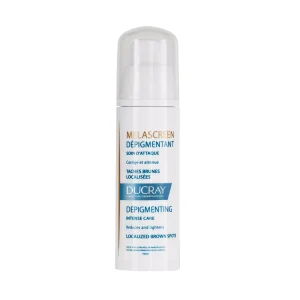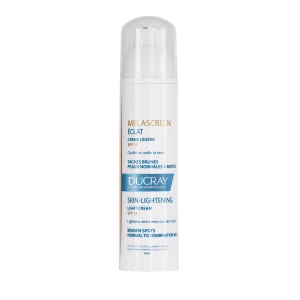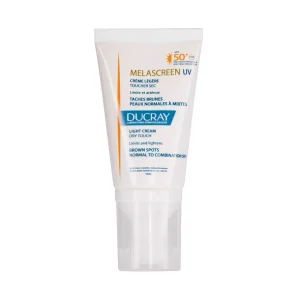
Are you suffering from uneven darkening of your skin? This could be due to excessive melanin production in your skin. Skin color is probably one of the most noticeable differences we see in people. So how come everyone has a different skin color? Melanin pigment is the answer!
Scroll down to find out what causes excessive melanin production in your skin and how you can manage it in this article from The Dermo Lab in collaboration with the dermatologist Dr. Sonia Nabeel Astafan.
What is the function of melanin pigment?
Melanin is a color pigment produced by a specific type of epidermal cells called “melanocytes”. It is responsible for the pigmentation of the skin, hair, and eyes. The more melanin pigments your skin produces, the darker your skin tone.
In addition to this role, Dr. Sonia Nabeel Astafan indicates that melanin plays an essential role in protecting against the sun’s harmful rays.
According to studies, scientists have identified three common forms of melanin in humans. Eumelanin and pheomelanin are found in the epidermal layer of the skin, while neuromelanin is found in the brain. Dr. Sonia Nabeel Astafan notes that melanin decreases with age.
What causes excessive levels of melanin in your skin?
While overexposure to the sun is the most common cause, other factors contribute to increased melanin production in your skin:
- Skin inflammation
- Hormonal imbalances
- Aging
- Vitamin deficiency due to malnutrition
- A rare endocrine disease called Addison’s disease can produce hyperpigmentation that appears primarily on the face, neck, and hands.
- Pregnancy affects hormone levels and can alter melanin production in some women.
An increase in melanin pigment production can lead to hyperpigmentation. The resulting patches and spots may appear darker than the surrounding skin. Some forms of hyperpigmentation, including melasma and sunspots, are more likely to appear on sun-exposed areas, including the face, arms, and legs.
What are the benefits of melanin pigment in the body?
- Protects against UV rays
Melanin helps protect cells from UV rays. This protection extends to all types of UV light, as well as blue light. The skin does this by absorbing UV light before it can damage the sensitive DNA of skin cells.
- Acts against reactive oxygen species (ROS) scavenger
As an antioxidant, melanin also removes reactive oxygen species (ROS) generated by ultraviolet light damage. Without protective antioxidants, ROS promote oxidative stress, which damages cellular DNA.
- Gives the skin a hydrated look
Due to its role in limiting free radicals in the skin, melanin can stop the negative effect of free radicals from drying out your skin. Thus, it helps keep the skin hydrated.
According to Dr. Sonia Nabeel Astafan, if melanin decreases, the skin and cells become discolored. In addition, DNA will mutate due to UV exposure and lack of melanin protection.
How to correct pigmentation?
Excess melanin can develop in certain areas, causing skin darkening. However, it is possible to reduce melanin production and existing melanin deposits in the skin. You can opt for one of the following treatments:
- Laser therapy:
This involves removing the top layers of your skin with a pulse of light to reduce melanin in the treated areas.
Below are some of the most popular laser therapies used to reduce melanin:
- Ablative lasers (recommended for severe skin discoloration conditions)
- Non-ablative lasers
- The QSRL (Q-switched ruby laser)
Laser therapies can also have side effects such as infections and scarring on your skin. You should therefore consult your dermatologist before opting for laser therapy.
- Topical products:
You can find several lightening creams or ointments that contain ingredients that act as tyrosinase suppressors in your skin. Tyrosinase is an enzyme that is responsible for the production of melanin in your skin. Thus, creams or ointments containing the following ingredients help slow down melanin production and ultimately reduce it.
- Retinoids
- Kojic acid
- Vitamin C
- Hydroquinone
- Azelaic acid
- Glycolic acid
Keep in mind that these products can have side effects such as irritation, redness, dryness, and itching on your skin. Therefore, it is always recommended to consult your doctor who will prescribe the right formula for your skin type.
Here are 2 products that lighten and even out the complexion, one enriched with azelaic acid and glycolic acid, the other enriched with vitamin C.
Ducray Melascreen Depigmenting Intensive Care
Ducray Melascreen Eclat Light Cream SPF15
- Use a sunscreen with SPF 30+:
When your skin is exposed to the sun, it creates more melanin. Therefore, using sunscreen will limit this process and protect your skin from harmful UV rays.
If you already have dark spots, wearing sunscreen will prevent UV rays from increasing melanin production and worsening the appearance of dark spots. If you haven’t developed dark spots yet, sunscreen acts as a shield, preventing the overproduction of melanin.
You should apply sunscreen to all skin that is not covered by clothing. For best results, dermatologists also recommend wearing a wide-brimmed hat when you are outdoors.
We recommend the following sunscreen which is effective against dark spots and photo-aging.
Ducray Melascreen UV Light Cream SPF50+
- Chemical peels:
This involves using chemicals such as lactic acid or glycolic acid on your skin to reduce existing melanin deposits. It is recommended for people who have excess melanin over a long period of time.
Summary on how to reduce melanin
In a nutshell, melanocytes produce melanin on the surface of the skin, which gives it its pigment. Each individual has a different amount of melanin in their skin.
The amount of melanin in the skin can decrease or increase depending on certain conditions and environmental factors.
We have discussed a number of remedies to reduce the amount of melanin in your skin. However, any pigmentation treatment options should be discussed with a medical professional.
FAQs
What vitamins reduce melanin?
Vitamin C, vitamin B12, and vitamin E are believed to lighten your skin and reduce melanin levels.
Why is my face darker than my body?
In general, the skin on the face is darker than the rest of the body because the face produces more melanin. Being exposed to more sunlight than any other part of the body can damage the melanin cells in the skin, resulting in a darker complexion than other parts of the body.
Is it possible to permanently reduce melanin production?
Dr. Sonia Nabeel Astafan affirms that it is possible to permanently reduce melanin production with oral and topical medications, laser therapy, and chemical peels.
How do you reduce melanin through diet?
To reduce excessive melanin deposits on your skin, your diet should be rich in antioxidants. Include healthy fruits and vegetables such as oranges, berries, papayas, lemons, kiwis, guavas, mangos, grapes, spinach, carrots, beets, etc. in your diet on a regular basis.
Last Updated on February 16, 2024












